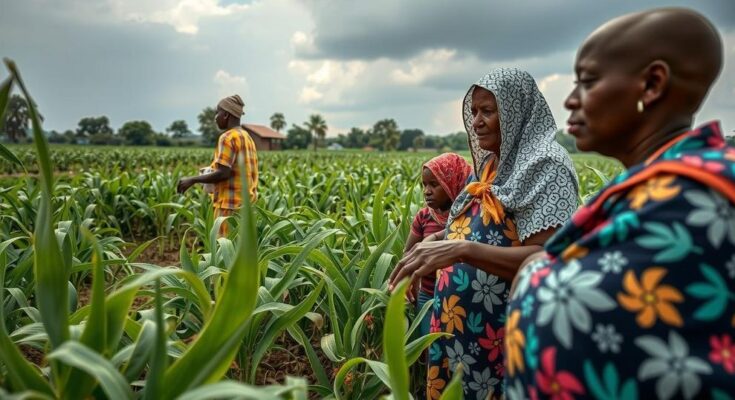Awad Usman, a refugee farmer in Maban, South Sudan, faces challenges from climate change and flooding as he grows sesame and sorghum. The UNHCR supports him and others through training, resources, and infrastructure projects aimed at improving resilience to climate impacts, ensuring food security, and promoting sustainable livelihoods amidst the struggles faced by refugees and local populations.
Awad Usman, a 37-year-old refugee from Sudan, has faced numerous challenges as he cultivates sesame and sorghum in Maban, South Sudan. Attached to his arm, he carries a small prayer for protection that he renews each year, especially at the start of the rainy season. Awad arrived in South Sudan over a decade ago, fleeing violence and conflict, and he continues to reside in a refugee camp where he has established a modest life through agriculture. Maban County is traversed by four rivers, which pose significant flooding risks during the rainy season, adversely affecting the local population’s livelihoods. Awad recounted a recent flood that devastated his sesame crops, rendering him unable to check on them for several days. This incident exemplifies the growing impact of extreme weather, including floods and droughts, which compounds the hardships faced by individuals already displaced by conflict. As noted during the ongoing COP29 summit, the UNHCR and climate activists are advocating for increased support and funding to assist vulnerable communities. South Sudan is classified as one of the most climate-vulnerable countries globally, where refugees experience heightened challenges. Since the mid-1970s, rainfall has declined by 10 to 20 percent, while the frequency of catastrophic flooding has escalated, displacing over 271,000 individuals in recent occurrences. Awad typically secures sufficient crops to sustain his family; however, losses from flooding often force him into additional labor to meet their needs. The plight of food insecurity is prominent among both refugees and local residents, according to Alex Noel Kilong, Assistant Livelihoods and Economic Inclusion Officer with the UNHCR. He emphasizes the compounded burdens faced by these communities, who must navigate both ongoing conflict and climatic adversities. In response, the UNHCR has initiated programs to support farmers like Awad, providing essential land access, financial assistance for seeds, and training on adaptive agricultural practices. These initiatives include crop diversification strategies, enhancing year-round farming resilience, and introducing higher-value crops such as sesame. Moreover, infrastructural projects have been established to mitigate flooding impacts, including the construction of dykes and bridges. These developments are crucial for safeguarding farmland, enabling farmer access, and preserving local economies. This agricultural season, Awad effectively implemented the strategies he learned, resulting in a successful sesame harvest, despite some flooding risks. Awad and his family engage enthusiastically in their agricultural tasks, finding joy in their work amidst challenging conditions. “I sing a proud song to my crops; it gives me happiness,” he stated, showcasing the resilience and hope that characterize his daily life.
The plight of refugees in South Sudan is exacerbated by the challenges posed by climate change. Following decades of conflict in the region, many individuals have been displaced, seeking refuge in areas like Maban County. The agriculture in this region is vital for both refugees and local residents, providing essential food resources and economic stability. However, the increasing frequency of extreme weather events threatens agriculture, posing significant risks to food security and overall livelihoods. The UNHCR is actively working to address these challenges through support programs aimed at developing adaptive agricultural practices and strengthening community resilience against climate-induced adverse effects.
In conclusion, the cooperative efforts between the UNHCR and local farmers in South Sudan, such as Awad Usman, illustrate the importance of supporting vulnerable communities in the face of climate change. By providing resources, training, and infrastructure to enhance agricultural resilience, these initiatives aim to secure livelihoods and empower refugee farmers. Awad’s successful harvest amidst challenging environmental conditions serves as a testament to the effectiveness and necessity of targeted assistance in building sustainable futures for displaced populations.
Original Source: www.unhcr.org




